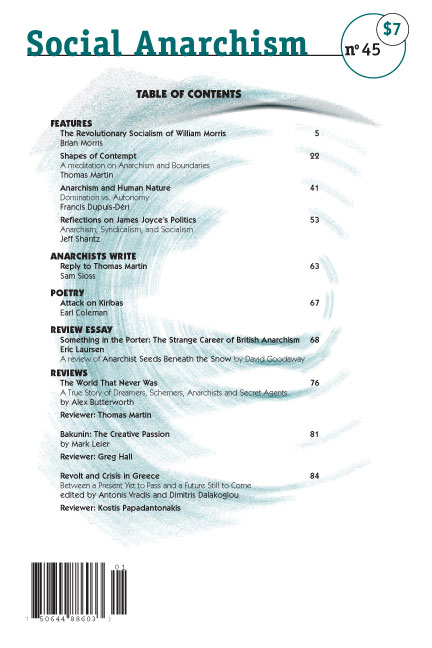Anarchism and Human Nature
We know that we ourselves are not without faults and that the best of us would soon be corrupted by the exercise of power. We take men for what they are worth — and that is why we hate the government of man by man…
Peter Kropotkin, Anarchism (2002: 136)
In my capacity as professor of political science I have often presented to my students the political principles of anarchism: liberty, equality, solidarity. I have explained that the goal of anarchists is the reorganization of human relationships to the exclusion of domination in every sphere of human activity: politics, economy, culture, love and sexuality, etc. I have also specified that, like any political philosophy, anarchism proposes above all a regulating ideal. There is always a gap between the idea (anarchism) and the practice (anarchy). Human beings, whether or not they are anarchists, are imperfect and can never live up to their philosophical ideals. Furthermore, human beings rarely espouse all the principles of a political ideology. Finally, the supporters of a given ideology do not always agree on the definition and ranking of their fundamental principles. Consequently, all regimes —liberal, communist, theological, monarchist, fascist, etc. — display a number of inconsistencies and imperfections when they are assessed against the political philosophies and ideologies to which they subscribe.
Too often, however, certain inconsistencies in liberal regimes are excused, whereas absolute coherence is demanded of anarchism and anarchy. Whenever I introduce the subject of anarchism to friends or colleagues, in a classroom or a public lecture, there is always someone who will point to a magazine article or TV documentary about chimpanzees, proving incontrovertibly that anarchy is impossible because hierarchy and inequality are naturally determined constants. There will always be, the argument goes, alpha males in a formal or informal position of domination due to chromosomes, hormones, differences between the sexes, and the laws of natural selection. The anarchist historian Harold Barclay (1990: 12) of the University of Alberta (Canada), attests to this elitist conviction, which in his view is widespread in universities: “[I]t has been my experience in more than 30 years of teaching anthropology that, among students, about the most firmly held myth is the one that no society can exist without government — and its corollary that every society must have a head.” Concerning my own discipline, Barclay adds, “In the Universities, political ‘science’ departments are the chief centres for the promulgation of this myth.”
In my courses I sometimes refer to the work of anthropologists (including Barclay, Pierre Clastre, and David Graeber) and historians who have studied leaderless societies, like those of the Native Peoples of North America, who governed themselves through assemblies where deliberation took place on issues of common interest. This is usually met with shrugs and comments to the effect that there were certainly individuals who were more influential than others and exercised their domination over the community, and, in any case, they were massacred by the Europeans, which proves that domination ineluctably finds a way to prevail. Another question that is almost always raised is this: How could an anarchist society respond effectively to an insane person roaming the streets with a chainsaw and looking for heads to cut off? There have to be prisons and police officers, don’t there? So anarchy is impossible.
Seeing that the demand for absolute coherence does not apply to other kinds of regimes (liberalism, for instance, which is hardly free of inconsistencies), I have reached the conclusion that the rhetorical aim of such objections is to deny all possibility of reflecting on the potentials of anarchism by focussing on a single problem or by indentifying a single contradictory example. Or, to put it more bluntly, “the use of ‘human nature’ as an argument against anarchism is simply superficial and, ultimately, an evasion. It is an excuse not to think” (McKay circa 2007: 3).
I have formulated two hypotheses that may explain this inability, indeed this refusal, to imagine a society without domination. The first, confirmed by an informal poll in my classes, is that the students involved were incapable of imagining a leaderless community because they had never experienced one: from family life to summer camp, to sport teams, scouts and guides, student associations, religious groups, up to and including college, they had always found themselves in hierarchically structured institutions. As the Italian anarchist Errico Malatesta (2004: 17 [our translation]) has noted, “[L]ike all living creatures, humans adapt and grow accustomed to their circumstances […]. Born in chains and heir to a long tradition of slavery, humans believed, when they began to think, that slavery was the very characteristic of life, and freedom seemed impossible to them.” Moreover, how can one conceive of the absence of domination and hierarchy when official history amounts to the names of a few great leaders: Alexander, Caesar, Richard the Lion Heart, Attila, Louis XIV, Christopher Columbus, Washington, Napoleon, Hitler, De Gaulle, Stalin, Mao, John F. Kennedy, Pol Pot, Barack Obama, Osama Ben Laden?
Another, more cynical, hypothesis may explain the apparent impossibility for these students of forming an idea of anarchy. After all, many of them hope their degrees will allow them to occupy leading positions in society. Moreover, the simple fact of being in college means they already have a stake in an inegalitarian society, where they are part of the elite. As Peter Kropotkin (2002: 146) observes, “[…] it must not be forgotten that men of science, too, are but human, and that most of them either belong by descent to the possessing classes and are steeped in the prejudices of their class, or else are in actual service of the government. Not out of the universities therefore does anarchism come.”
Nevertheless, whether out of ignorance or interest, my students were attuned to many of the critiques of anarchism articulated by political philosophers such as Benjamin Barber (1972) and Todd May (1994) claiming that (1) anarchism’s conception of human “nature” is utopian or overly optimistic and (2) anarchism must therefore be unable to conceptualize the political, which is always a matter of power, authority, and hierarchy. Such critiques occur so frequently as to warrant a response.
Human Nature: Is Anarchism Optimistic?
According to David Miller (1984: 76), the author of a general survey of anarchism, there are “two common errors” on the subject of this political philosophy: “[O]ne, that all anarchists hold the same beliefs about human nature; the other, that these beliefs are excessively optimistic, in the sense that they present human beings in far too favourable a light.” In fact many anarchists who have considered the question of human nature begin their discussions with a reminder that anarchism is often criticized for putting forward an overly optimistic view of human nature. In their pamphlet “What About Human Nature?” the anarchists Ian McKay, Gary Elkin, Dave Neal and Ed Boraas (circa 2007: 2) state, “one of the greatest myths about anarchism is the idea that we think human nature is inherently good.” David Hartley (1995: 146-147), for his part, in “Communitarian Anarchism and Human Nature,” notes that those who disparage anarchism often suggest that anarchists defend the “naivety thesis,” whereby “an anarchist society makes egoism disappear.” And in her study titled Anarchism and Education, Judith Suissa (2010: 24) quotes Max Beloff, for whom anarchism “is based on a fundamental misunderstanding of human nature, on the unproven supposition that given total absence of constraints, or alternatively material abundance secured by communism, human societies could exist with no coercive element at all” (see also Wolff 1996: 34).
Granted, some anarchists do indeed have an optimistic conception of human nature, but their outlook hardly represents the totality of anarchist thought. As of the end of the 19th century, anarchists debating with the advocates of social Darwinism framed arguments on biological as well as historical-anthropological grounds in order to prove with historical evidence the existence of a vast tradition of egalitarian communities where mutual aid was practiced, both among animals and human beings. Kropotkin (1924) devoted an entire chapter of Ethics: Origin and Development (drafted c. 1900) to “The Moral Principle in Nature,” in which he discusses Darwin’s theses. Contrary to the commonplace popularized interpretations of Darwinism, Kropotkin points out that in The Descent of Man Darwin acknowledged the innate sociability of most animals and of human beings. Other anarchists, such as anthropologist Harold Barclay (1997: 113), warn against drawing simplistic and unqualified parallels with violent and aggressive animals to justify the same sort of behaviour in humans. Yes, chimpanzees are violent and aggressive, but gorillas, bonobos, gibbons, and orang-utans are not, and some contemporary primate specialists (e.g. Frans de Waal 2005) have even concluded their studies with references to anarchism and to Kropotkin’s notion of mutual aid.
David Loye, a Darwin specialist, observes that in The Descent of Man there are only two references to the survival of the fittest, one of which is made in the context of the recognition by Darwin that he had overstated the importance of that idea in The Origin of Species. By contrast, there are 24 references to mutual aid, 61 to solicitude for others and 90 to morality (Loye 2000: 5-6-). Kropotkin (1927: 41 [our translation]) quotes Darwin to the effect that “social instincts lead animals to find pleasure in the society of their companions, to feel a certain affection for them, and to be of service to them in various ways.” This instinct sometimes overrides the parental instinct, as evidenced by migratory birds that abandon their young if they are too weak to undertake the long voyage. Furthermore, “a natural law exists, even among the big cats,” Kropotkin (1927: 64 [our translation]) notes: animals “never kill one another” within the same species. He thus regards mutual aid as a factor in natural evolution. Among animals, mutual aid is necessary for at least three reasons: (1) to raise offspring; (2) to find food for the group; (3) for safety’s sake (keeping watch, warnings). What is more, animals form groups to travel (e.g. the great migrations) or simply for the pleasure of playing together.
In addition, many anthropologists and historians remind us that for the greater part of history humanity has lived in communities unfamiliar with private property and functioning without either leaders or hierarchies (at least among males and at times regardless of sex): Pygmies, the Tiv of Nigeria, the Santals of eastern India, and the Inuit. It appears that some of these peoples lived without a state for tens of thousands of years. Even in a context of extreme material poverty (e.g. the Inuit) the principle of “every man for himself” has not prevailed. In short, a non-hierarchical (hence egalitarian) society is not a utopian dream but an integral and very significant part of human experience.
The tendency of some anarchists to emphasize a distinct aptitude for mutual aid among living creatures, including human beings, no doubt explains why other anarchists blame anarchism for proposing an idealist and overly optimistic conception of human nature. James Joll (1980: 13), a historian of anarchism, in fact asserts that “anarchism presupposes the natural goodness of man.” The contemporary theorist of anarchism, Todd May (1994: 62-63), wonders why we should believe that the abolition of power would produce a better society: “This question goes to the heart of anarchist thought [… and] the answer has always been the same: the human essence is a good essence,” one that is stifled by power relations. According to May, anarchism “is imbued with imbued with a type of essentialism or naturalism that forms the foundation of its thought. People are naturally good […]”. However, in his view anarchist thought could survive, at least as a major critique of inegalitarian relations of power, by adopting a less optimistic conception of human nature (May 1994: 65).

